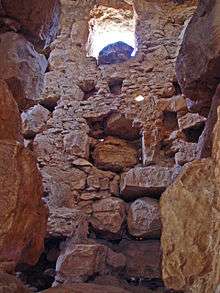Mazor
| Mazor מָזוֹר | |
|---|---|
|
| |
 Mazor | |
| Coordinates: 32°3′9″N 34°55′33.95″E / 32.05250°N 34.9260972°ECoordinates: 32°3′9″N 34°55′33.95″E / 32.05250°N 34.9260972°E | |
| District | Central |
| Council | Hevel Modi'in |
| Affiliation | Moshavim Movement |
| Founded | 1949 |
| Founded by | Jewish immigrants from Czechoslovakia and Hungary and native Israelis |
| Population (2015)[1] | 1,300 |

Mazor (Hebrew: מָזוֹר, lit. Cure) is a moshav in central Israel. Located in the Sharon plain around three kilometres south-east of Petah Tikva and covering 2,300 dunams, it falls under the jurisdiction of Hevel Modi'in Regional Council. In 2015 it had a population of 1,300.
History
The moshav was established in 1949 by immigrants from Czechoslovakia and Hungary and by native-born Israelis. It was initially named Mizra Har (Hebrew: מזרע הר, lit. Sown Field on a Mountain), but was later renamed Mazor, a name derived from the name of the depopulated Arab village of al-Muzayri'a. Mazor's early days form the subject of a work of historical fiction, Kfar BaSfar ("A Village on the Border") by Gershon Erich Steiner, one of Mazor's founders.[2]
Mazor was founded on land belonging both to the depopulated Arab village of Rantiya,[3] and the western land belonging to al-Muzayri'a.[4]
To the east of the moshav is an archaeological site, which includes a 3rd Century Roman mausoleum. The mausoleum is the only Roman era building in Israel to still stand from its foundations to its roof. A Byzantine-era mozaic floor was found not far from the mausoleum.
References
- ↑ "List of localities, in Alphabetical order" (PDF). Israel Central Bureau of Statistics. Retrieved 16 October 2016.
- ↑ About Mazor Homee
- ↑ Khalidi, Walid (1992). All that Remains. Washington DC: Institute for Palestine Studies. p. 252. ISBN 0-88728-224-5.
- ↑ Khalidi, p399